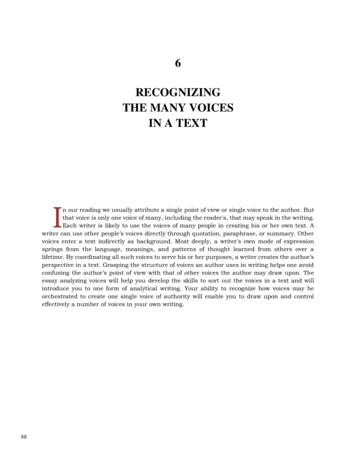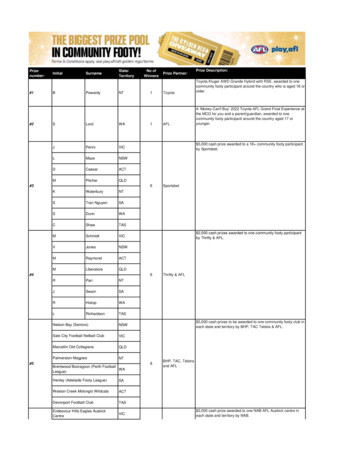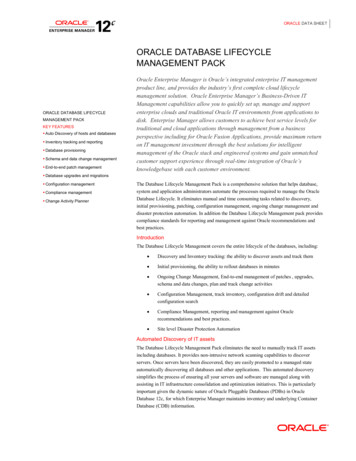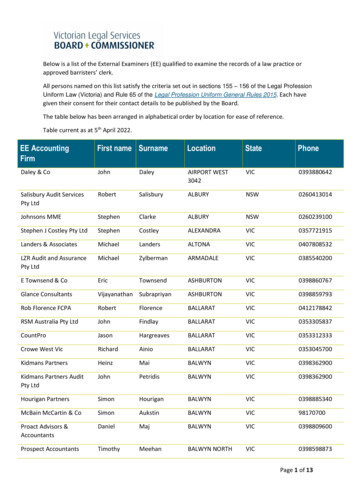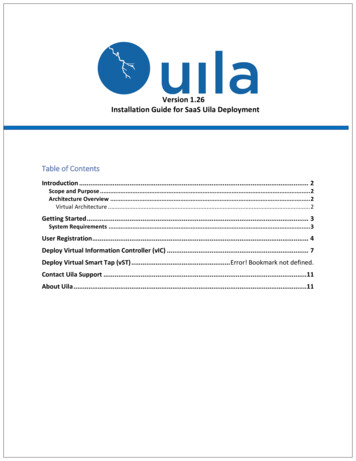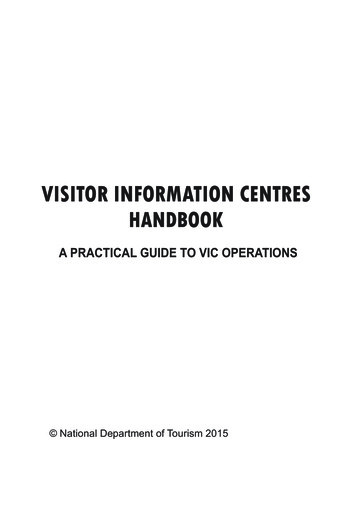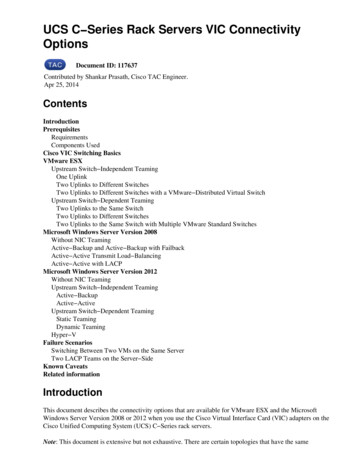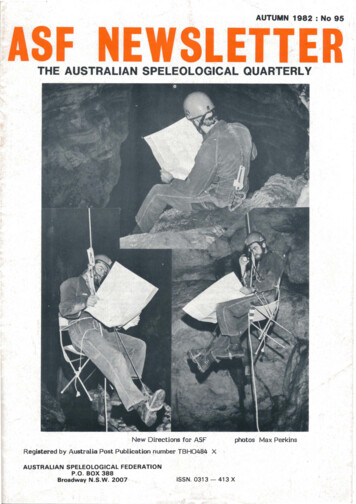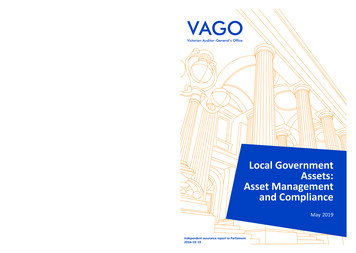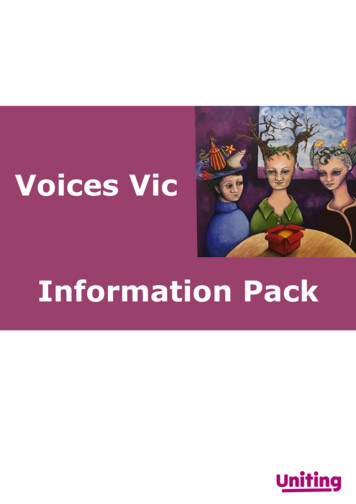
Transcription
Voices VicInformation Pack
Table ofContentsWhat is Voices Vic? . .3Hearing Voices Approach . .3Our Services . .3Information Sessions . . . 3Introduction Workshops . 3Training Calendar . . . 4Additional Support Package . . 5Hearing Voices Groups . . . 5NDIS Hearing Voices Group .6One on One Peer Support . . . .7Speaking Engagements . . 7Volunteering . . . . .7Coping Skills for Voice Hearers . . .8Information for Friends, Family & Carers . . .10Resources. . . . .10Contact Us . . . .112
Voices VicWhat is Voices Vic?Uniting’s Voices Vic is an award winning and research supported specialist program improving thewellbeing and recovery of people who hear voices. Led by peers with lived experience, Voices Vicprovides dynamic recovery groups and one-on-one support. Our team also facilitates training acrossAustralia for organisations and individuals who work with voice hearers.Hearing Voices Approach: Hearing voices is a common human experience Recovery is about changing the relationship with the voices and transforming the voice hearers’experiences to acceptance The experience of hearing voices is meaningful We define ‘hearing voices’ as an umbrella term used to refer to auditory, visual, olfactorysensory experiences, and beliefs that others around them do not experienceOur ServicesVoices Vic has been delivering training, information sessions, one on one sessions and providingsupport to the voice hearing community in Australia for over ten years. Our team of peer workprofessionals have lived experience of hearing voices and recovery, and are highly experienced withinthe facilitation field. We offer a range of training for individuals, mental health professionals, peerworkers, voice hearers and family members. We also offer specialised external training packages forclinics, hospitals and other health organisations.‘The Hearing Voices Approach’ training is endorsed by the Australian Association of Social Workers(AASW) and the Australian College of Mental Health Nurses (ACMHN) for contribution towards theirprofessional development.Our trainings are delivered in person and online.To enquire about Voices Vic training please contact: vvtraining@uniting.orgInformation SessionsWe offer a free half hour Information Session via Skype or in person (depending on location).Introduction WorkshopWe offer a two-hour Introduction Workshop which includes: Q&A with one of our peer workers with lived experienceBrief introduction to the Hearing Voices ApproachPractical coping skills voice-hearers and professionals can use to reduce distress3
Training CalendarThe Hearing Voices Approach Training3 DaysThis course is the foundation to the Hearing Voices Approach. The firsttwo days will give you a solid understanding of applying the approach inmany practical settings, either for yourself, in your work as a mentalhealth professional or in your family/home environment.The final day covers Voice Profiling - a set of accessible strategies thathelp build greater awareness and understanding of a person’s voices. Bythe end of this training you will have more tools and confidence to workwith people’s voice hearing experiences.Hearing Voices Group Setup Training4 DaysThis interactive 4-day training is for people wanting to start and/or (co-)July14, 15, 21OnlineSeptember15, 16, 22TBCNovember10, 11, 17TBCAugust11, 12, 18, 19Onlinefacilitate a Hearing Voices Support Group. The first two dayswill cover an in-depth understanding of the Hearing Voices Approach andOctoberthe second half of the training will cover Voice Profiling and the setup20, 21, 27, 28tools & strategies for getting a Hearing Voices support groupTBCstarted.Hearing Voices Facilitation Training4 DaysThis interactive training is ideal for any current or aspiring peer workers& facilitators wanting to build upon their facilitation skills in creativeapproaches to group facilitation & learning how to Use Your Story tolead recovery based, peer-led support groups.By the end of this training you will have greater knowledge andThis training will beoffered in 2021awareness on how to deliver talks, share and adapt your story torelevant audiences & facilitate groups engaging creative approaches.4
Additional Support PackageWe offer an additional support package to those who have completed our Hearing Voices Group SetupTraining.Our Support Package includes: 6 x hours of private mentoring with one of our facilitators20% discount to attend our Hearing Voices Advanced Facilitation Training1 x contact visit of group in person or via ‘Microsoft Teams’PDF Resource KitPhone and email support6 monthly progress reportOpportunity to visit our Hearing Voices groups twiceHearing Voices GroupsWe provide peer led recovery groups for voice hearers to share their experience, learn new copingstrategies and explore ways to grow and change the relationship with their voices. The groups providean open space for the voice hearer to feel comfortable and give a sense of hope and possibility.Individuals can also use their NDIS packages to access the groups.Our Hearing Voices Groups are delivered in person and online.Topics in groups include: What the voices have been saying this weekPast experiences with voicesAssociated thoughts and emotionsSetting boundaries with voicesFinding meaning and making sense of the voice hearing experienceSharing recovery storiesExploring hopes and dreamsHearing Voices groups have been running around the world since 1987 and are currently active in 30countries. We support and work in partnership with other Hearing Voices networks in Australia andglobally. Voices Vic was established by Uniting in 2009 after successfully running Hearing Voicesgroups since 2005. We currently offer NDIS groups for eligible participants.5
NDIS HearingVoices GroupsUniting Voices Vic now offers Hearing Voices Groups for NDIS participants. These Hearing VoicesGroups are also peer facilitated support groups for people who hear voices.NDIS Pricing and Package offersIf you want to use NDIS funding, the group falls under Capacity Building – Increased Social andCommunity Participation.Support Category NameSupport Item NumberSupport Item NameNational Non-Remote (MMM1-5)Increased social and community participation09 007 0117 6 3Skills Development In A Group 29.26 per hourVoices Vic will be offering the following Hearing Voices Group packages: New to Hearing Voices Groups package (4 sessions): The package includes 4 HearingVoices Group sessions, run weekly for 1.5 hours.3-Month package (12 sessions): The package includes 12 Hearing Voices Group sessions,run weekly for 1.5 hours.Location & Time: Please contact us to find out moreResearch conducted in Australia by Bevan (2016) showed that the majority of people who attended aHearing Voices Group: Had fewer hospital admissionsFelt less isolatedWere better able to talk about their experiencesWere less afraid of their voicesSome people found that their voices became more positiveThe emphasis is not on eliminating the voices, but rather on transforming the voice hearer’sexperiences from confusion and fear to acceptance and recovery. This aims to provide the skills to shiftthe power balance in a positive direction.To enquire about Voices Vic Hearing Voices Group please contact: vvadmin@uniting.org6
One on One Peer SupportWe offer sessions of individual peer support with a highly experienced trained peer worker who alsohas lived experience of hearing voices and recovery.Focus for the sessions can include:Telling Your Story: Being the expert on your own experiences Looking at voices in the context of your life story with help of timelinesChanging The Relationship: Learning new ways to cope with your voices Dealing with possible distress Learning to set boundaries with the voices Respectfully challenging the voicesMaking Sense Of The Voices: Looking for metaphors and the meaning of your experiences Accepting the voices are realSpeaking EngagementsOur team members regularly get invited to speak at conferences and events to share their recoveryjourney and raise awareness of the Hearing Voices Approach.To book one of our speakers, please contact: vvadmin@vt.uniting.orgVolunteering with Voices VicYou can volunteer your time and skills to Voices Vic and help support people who hear voices.7
Coping Skills forVoice HearersIt’s not about getting rid of your voices. It’s about changing your relationship withthem.It’s helpful to listen to your voices – but not all the time. Set a reasonable time limit for listening (e.g.one hour per day), and stick to it.Listen, but don’t obey your voices. Your actions must always be your choice.You always have more control than the voices – without you they wouldn’t exist.Talk with your voices as well as listening. A good relationship takes two (at least)!Speak to your voices with compassion and respect – how you wish they spoke to you.It can help to remember that voices usually have good intentions. They give voice to a part of you thatis hurting and can’t express itself any other way. In a way, they are like a hurt child, crying out.Challenge your voices if they make threats. Threats can be frightening but remember that voices lieabout their power. To prove this to yourself, set them a simple task such as “go and wash the dishes”or “trim my nails”. We think they’ll fail. If it feels scary to challenge the voices, ask someone you trustto sit with you.How to change your relationship with your voices.Read other people’s recovery stories.Don’t argue with voices – they usually win!Don’t take your voices too literally. Voices often don't mean what they say, or they talk in metaphors.E.g., violent suggestions from voices could mean you need to change something that’s not right inyour life or that you’re feeling angry or scared.Do your voices have names? If not, find out what their names are and use them - you’ll reduce yourfear and increase your control. If the voices won’t tell you, then you can give them names.Recognise trauma from your past. Most voice hearers have difficult experiences in their past – you arenot alone. What was happening in your life when you first started hearing voices? Your voices may bea sign that it’s time to try counselling, or to talk with someone you trust.Join a Hearing Voices group. Share your experiences and learn with others who have been there too.Don’t be alone.Give yourself time and hope. We know these are not easy changes to make. It takes heaps of practiceand support. But you can do it. Believing in yourself is the first step.8
Coping Skills forVoice HearersStrategies and techniques for managing voices.Make a deal - tell the voices you’ll listen later if they give you peace now. Try writing down theirmessages to clear your head and read later when you feel stronger.Set boundaries - Respect: Tell the voices you will only listen if they speak to you with respect. Time:Set a time limit, they only have 5 minutes and then the rest of the time is for you.Distraction techniques - Listen to different styles of music using headphones, wear ear plugs, call orvisit a friend, talk to others in a support group, watch TV, read a book, do housework, puzzles, cook anice meal for yourself, or take a shower or bath.Creative release approach – Put on music and dance it out, write poetry or other creative writing,draw, paint, make something out of clay, go to an exercise class, go for a walk or run, watch a movieyou love.My own strategies 9
ResourcesInformation for Friends, Family & CarersBeing the friend, family member or carer of someone who hears voices can feel confusing, frighteningand isolating. Here are some tools and ideas using the philosophy of the Hearing Voices approach werecommend for thinking about voices:Accept The Voices Are Real: Denying the reality of a voice hearer or advising the voice hearer to ignore them promotesdenial – whereas acceptance of their reality gives permission to start actively dealing with themand experiencing recovery.Self-Care: We believe that no person can do the recovery work for another, no matter how much we lovethem. As friends, family members and carers, we need to ensure we have support, people toshare and debrief with, an ability to let go and have a healthy balanced life.Changing The Relationship To The Voices: Focus on helping the person to build understanding and get control, rather than only focusingon getting rid of the voices. Many voice hearers have learnt to focus on their positive voices, setstrong boundaries with their voices or found new ways to interpret and make sense of what thevoices say.Other ResourcesThe International Hearing Voices Networkwww.intervoiceonline.orgStrategies for Coping Skills by Indigo Daya (founding member of Voices Vic)Download PDFWorking to Recovery UK – books and personal recovery storieswww.workingtorecovery.co.ukRufus May – Holistic Approaches to Mental Healthwww.rufusmay.comThe Voice Collective – Young Voice Hearershttp://www.voicecollective.co.uk/10
Contact usLearn Morewww.unitingvictas.org.auGet in touchPhone: 9692 9500Training Enquiries: vvtraining@vt.uniting.orgGeneral Enquiries: vvadmin@vt.uniting.org11
3 What is Voices Vic? Uniting's Voices Vic is an award winning and research supported specialist program improving the wellbeing and recovery of people who hear voices.

